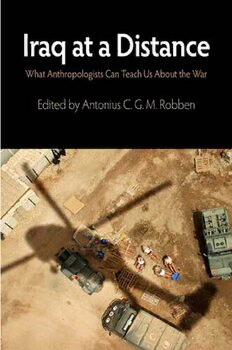
Iraq at a Distance: What Anthropologists Can Teach Us About the War PDF
Preview Iraq at a Distance: What Anthropologists Can Teach Us About the War
Iraq at a Distance .................17498$ $$FM 09-17-0915:49:17 PS PAGEi THE ETHNOGRAPHY OF POLITICAL VIOLENCE CynthiaKeppleyMahmood,SeriesEditor Acompletelistofbooksintheseries isavailablefromthepublisher. .................17498$ $$FM 09-17-0915:49:17 PS PAGEii Iraq at a Distance What Anthropologists Can Teach Us About the War Edited by Antonius C. G. M. Robben University of Pennsylvania Press Philadelphia .................17498$ $$FM 09-17-0915:49:17 PS PAGEiii Copyright(cid:2)2010UniversityofPennsylvaniaPress Allrightsreserved.Exceptforbriefquotationsusedforpurposesofrevieworscholarly citation,noneofthisbookmaybereproducedinanyformbyanymeanswithout writtenpermissionfromthepublisher. Publishedby UniversityofPennsylvaniaPress Philadelphia,Pennsylvania19104-4112 PrintedintheUnitedStatesofAmericaonacid-freepaper 10 9 8 7 6 5 4 3 2 1 LibraryofCongressCataloging-in-PublicationData Iraqatadistance:whatanthropologistscanteachusaboutthewar/editedby AntoniusC.G.M.Robben. p.cm.—(Ethnographyofpoliticalviolence) Includesbibliographicalreferencesandindex. ISBN978-0-8122-4203-4(alk.paper) 1.Warandsociety—Casestudies. 2.Politicalanthropology—Fieldwork—Case studies. 3.WaronTerrorism,2001– 4.IraqWar,2003–. I.Robben,Antonius C.G.M. GN497.I73 2010 303.6(cid:2)6—dc22 2009027546 .................17498$ $$FM 09-17-0915:49:17 PS PAGEiv Contents Preface vii EthnographicImaginationataDistance:AnIntroductiontothe AnthropologicalStudyoftheIraqWar 1 AntoniusC.G.M.Robben 1. ‘‘NightFellonaDifferentWorld’’:DangerousVisionsandthe WaronTerror,aLessonfromCambodia 24 AlexanderLabanHinton 2. TheWaronTerrorandWomen’sRightsinIraq 57 NadjeAl-Ali 3. TheWaronTerror,Dismantling,andtheConstructionofPlace: AnEthnographicPerspectivefromPalestine 80 JuliePeteet 4. LosingHeartsandMindsinthe‘‘WaronTerrorism’’ 106 JeffreyA.Sluka 5. MimesisinaWarAmongthePeople:WhatArgentina’sDirty WarRevealsAboutCounterinsurgencyinIraq 133 AntoniusC.G.M.Robben Epilogue 159 IbrahimAl-Marashi ListofContributors 175 Index 179 .................17498$ CNTS 09-17-0915:49:20 PS PAGEv This page intentionally left blank Preface ThisvolumeisnotatypicalanthropologybookaboutIraq.The essays were written in the midst of the Iraq War and lack, therefore, the hindsightthatoftenbenefitsscholarlyanalyses.Moreover,thecontributing authorsdidnotconductthelong-termfieldworkthatcustomarilyunderlies most anthropological studies. The physical danger to foreign civilians in Iraq was so great that even experienced war correspondents were for years abletoleaveBaghdad’sGreenZoneonlyondaytripssurroundedbyprivate securitycontractorsorembeddedinmilitaryunits.Thisbookshows,how- ever, that the impossibility of conducting ethnographic fieldwork in war zonessuchasIraqdoesnotpreemptanthropologicalinterpretation. This book arose from three pressing concerns in mid-2005: a moral outrage against the Iraq War, the absence of an anthropological voice in professional and public debates, and the similarities with previous armed conflictsworldwide(Robben2005).Theangeranddismayoverthesteeply risingnumberofdeadastheIraqWardraggedon,theurbicideofFallujah, thedisplacementofmillionsofcitizens,thegruesomebeheadingofkidnap victims, the lethal roadside bombs, the mistreatment of Iraqi civilians— withthehumiliationofinmatesatAbuGhraibprisonasthefirstpublicjolt thattherewassomethingprofoundlywrongwiththewar—andtheterrible waste of resources in the mismanaged reconstruction of Iraq’s infrastruc- turewerefeltbymanypeople,notjustanthropologists.Numerousanthro- pologistsvoicedtheiropinionsathome,amongfriendsandcolleagues,and maybe in the classroom, but few brought their anthropological knowledge tobearontheissuesdiscussedinthepublicdomain.Someanthropologists withexpertiseintheMiddleEastwroteop-edsabouttheethnocentrismof foreigntroopsfightinginIraqandpointedouttheblindnessofourpolitical leaders to Iraq’s turbulent political history and ethnic-religious complexi- ties,butthesewerelonevoicesamongthepoliticalscientists,militaryhisto- rians, foreign affairs specialists, and opinion makers that dominated the media.Theabsenceofananthropologicalperspectivewasallthemoresur- .................17498$ PREF 09-17-0915:49:22 PS PAGEvii viii Preface prising because anthropologists have since the 1980s been studying armed conflictsthathavemanysimilaritieswiththeIraqWar. TheseconcernsresultedintheformationoftheIraqResearchProject in early 2006, in which a group of anthropologists, seasoned in the ethno- graphic study of violence, suffering, and armed conflict, were invited to writeabouttheIraqWar.Sincethen,theAmericanAnthropologicalAssoci- ationhasexaminedtheinvolvementofanthropologistsintheU.S.military and has been reviewing its code of ethics (AAA Commission 2007). Fur- thermore,manyanthropologistshavepledgedthemselvestotheopposition against research and service for the military initiated in 2007 by the Net- work of Concerned Anthropologists (Members 2007). Anthropological re- search about the Iraq War has concentrated mainly on the study of U.S. veterans and especially on the ethically questionable employment of an- thropologists by the military. This book focuses on the plight of the Iraqi peopleinthisdevastatingwar,wagedunderthebanneroffreedomandde- mocracy, through comparisons between Iraq and past and present armed conflictsinCambodia,Israel,Palestine,NorthernIreland,Afghanistan,and Argentina.Theintroductorychapterconceptualizesthemethodologicalap- proachtothestudyofinaccessiblewarzonesanddiscussestheimportance of comparative anthropology in interpreting the fragmentary, conflicting, and partisan information emerging from those fronts. The five ethno- graphicchaptersanalyze,respectively,theManichaeandiscourseofthewar on terror, the deterioration of women’s rights in Iraq, the ethnic-religious partitioningofBaghdad,thelossofpopularsupportfortheU.S.andCoali- tion forces in Iraq and Afghanistan, and the counterinsurgency warfare in Iraq.Thevolumecloseswithanepiloguethatdiscussestheanthropological findingsfromahistoricalperspective. Acknowledgments The Iraq Research Project could never have gotten off the ground without the intellectual generosity of its members. I want to express my warmest thanksto thecontributorsfor puttingtheir busyresearchagendas onhold toimmersethemselvesinthestudyoftheIraqWar.Myheartfeltgratitude goes to the University of Pennsylvania’s editor-in-chief, Peter Agree, for making this book a priority in a tight production schedule and for main- taininghisgraciousnessinanincreasinglytoughpublishingbusiness.Final thanks go to Ashley Nelson and Erica Ginsburg for efficiently guiding this .................17498$ PREF 09-17-0915:49:22 PS PAGEviii Preface ix book through the publishing process, and to Holly Knowles for preparing theindex. Bibliography AAACommissionontheEngagementofAnthropologywiththeU.S.Securityand Intelligence Communities. 2007. Final Report. http://www.aaanet.org/pdf/ FINAL_Report_Complete.pdf(accessed:December17,2007). Members of the Network of Concerned Anthropologists. 2007. The Network of Concerned Anthropologists Pledges to Boycott Counterinsurgency. Anthro- pologyNews48(December):4–5. Robben, Antonius C. G. M. 2005. Anthropology at War? What Argentina’s Dirty WarCanTeachUs.AnthropologyNews46(September):5. .................17498$ PREF 09-17-0915:49:23 PS PAGEix
